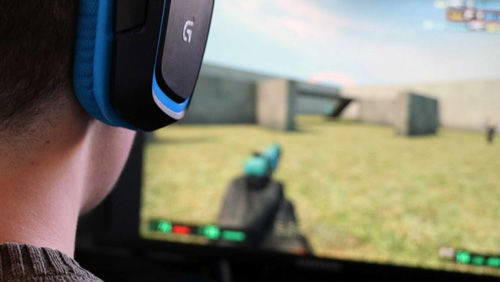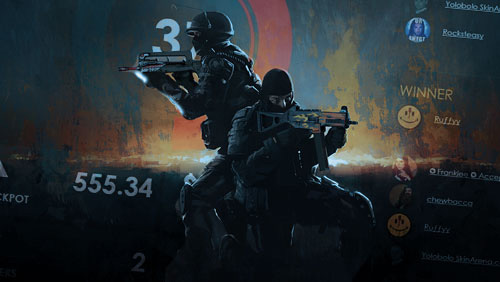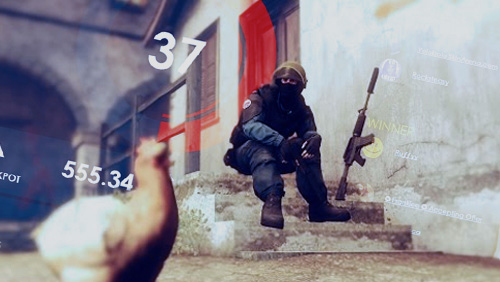This is a guest contribution by Lionel Iruk. An i‐gaming, international wealth management, M&A, principal attorney and manager at Empire Legal. If you would like to submit a contribution please contact Bill Beatty for submission details. Thank you.
International Gaming – Legal Contributor
The term skin gambling may come as a surprise to many a gambling enthusiast and even old experts in the area. This is because Skin gambling is a very recent development which evoked interest after the ‘Arms Deal Update’ in 2013 which allowed users to trade in virtual weapon skins on the game and was touted by the makers as one of the most important updates. It is essential that before we delve into the world of Skin Gambling and its legality, we have a correct understanding of the parties who are involved in this very niche area of Skin Gambling and then understand how the engine runs.
Origins of ‘Skins’
The world of ‘Skin Gambling’ and rather the term itself traces its origins to the game- Counter Strike: Global Offensive (CS:GO), one of the most popular games in Electronic gaming history. The game was developed by ‘Valve Corporation’ (‘Valve’) established under the laws of Washington, USA. Valve also designed a separate marketplace called Steam Community Market (‘Steam’) which allowed users to purchase virtual items for real money and also trade in those items with other users. Within the game, CS:GO, Valve introduced a system for item drop at regular intervals for the players. The dropped items had to be unlocked through the purchase of a ‘key’ from the Steam marketplace or through trade. The item drops were weapons cases and weapon skins which are now referred to as just ‘Skins’. The Skins were not in-game weapons which had a utility but just provided a unique look to the weapons such as knives or guns.
The real masterstroke from Valve in this regard was that Steam was provided with an API which can be used to integrate the service on other platforms. This resulted in the growth of a number of websites which allowed logging in with the Steam account for trading of ‘Skins’ between CS:GO enthusiasts. Over time, due to the rarity of certain Skins, a market built up which allowed the sale and purchase of Skins for real money. Largely due to the popularity of the game and the knowledge about the rarity of certain Skins, the market blossomed with a few rare Skins valued at over a thousand dollars. Valve on the other hand continues to benefit from an increase in transaction on the market as it receives a certain percentage cut from all transactions taking place on the market.
‘Skin Gambling’: How does it work?
 The concept of Skin Gambling emerged when the money value of the Skins was discovered in the market where there was a ready stream of customers willing to pay a certain price for a given skin. This led to establishment of websites which now allowed the Skins to be used as a replacement for money for the purpose of gambling. Basically, anyone with a Steam account could now gamble the Skins which they posses on a variety of different games.
The concept of Skin Gambling emerged when the money value of the Skins was discovered in the market where there was a ready stream of customers willing to pay a certain price for a given skin. This led to establishment of websites which now allowed the Skins to be used as a replacement for money for the purpose of gambling. Basically, anyone with a Steam account could now gamble the Skins which they posses on a variety of different games.
A few of the modes through which the Skins can be used are Pot based games where users deposit skins instead of money in the pot, games where the Skins are used to gamble in normal casino games like poker, roulette etc. and on Sports betting. Interestingly, Skin Gambling has grown together with the craze for betting on outcome of matches between professional players of famous computer games such as CS:GO and DOTA 2 which is referred to as Esports betting. Not surprisingly, Skins are also used for Esports betting and frequently both the development of Esports betting and Skin Gambling are considered as interlinked with each other. This is however only true to a limited extent and Esports betting is prevalent in many countries with the use of real money. Skin Gambling is only a small part of the larger Esport betting market which has a number of popular websites taking bets with real money on the outcome of Esports matches. The popularity of Esports viewership can be understood by the fact that esports live streaming website Twitch claims a viewership of around 100 million monthly viewers. The entire esports gambling market was worth around USD 8 Billion in 2016.
How big is Skin Gambling?
Although the concept of Skins is a recent development, the market for Skin Gambling has grown exponentially in a few years. It is estimated that more than 38 Million people visited the website CSGOlounge.com in March, 2016. Of the total esports gambling market of USD 8 Billion in 2016, around USD 7.4 Billion was through Skin Gambling and only around USD 600 million was gambled through cash.
The legal nuances of Skin Gambling
The new market for Skin Gambling has thrown open interesting questions on legality for the troika of governments, promoters of the gambling websites and also the creators of the game, Valve. The Gamers itself are not considered here because they are the consumers and not the regulators of the product.
Valve as the Key Player in the market
Among the troika mentioned before, the biggest factor behind the legal treatment of the Skin Gambling market is Valve’s own reaction to the market. This is because Valve is the owner of the Steam API which is essential for the integration of the gambling website with the User’s steam account. In case the user cannot log into the gambling website with his Steam account, then he practically will not be able to access the skins which we wants to gamble with or purchase more skins for the use of money. The prevalence of Skin Gambling is however not limited to CS:GO along and over the years a market has developed for trade of virtual items for real money and CS:GO is often disproportionately targeted as an unwanted development. In fact, there are a number of other games where virtual items have been purchased for prices much higher than a CS:GO skin. Adding to this, in reality, Valve has always maintained that it does not believe that Virtual items could not have a real monetary value and so does not directly control the market which has developed. This means that the market functions independently of Valve’s role until and unless Valve decides to cut down on the use of its Steam API by the gambling website providers. Recent reports suggest that Valve has taken action against some of the Gambling websites which provided CS:GO skin gambling options terming it as a violation of the terms and conditions. Whether the action was taken as a reaction to external pressure or the official policy of the Company is unknown and more developments are expected in the future.
Countries and their policies on Skin Gambling
The USA is one the biggest gambling markets in the world. However, it may come as a surprise to many that online gambling is not illegal in only four states across the country. Due to the illegality of Online gambling it would be a common presumption that even Skin Gambling and Betting would be illegal.
The Unlawful Internet Enforcement Act, 2006 is often used to justify the US prohibition on Online gambling as it “…prohibits gambling businesses from knowingly accepting payments in connection with the participation of another person in a bet or wager that involves the use of the internet and that’s unlawful under any federal state or law.”
However, cases around the country have decided on interesting cases which seem to indicate that the courts seem to have differentiated between virtual items and real money. In any event, the cases do not seem to indicate that online gambling is legal, but they show that the courts have recognised a difference between gambling through virtual items and gambling with real money.
In one of the first cases to come before the courts, in 2015, a player of the “massively multiplayer online game” ‘GoW’ alleged that she had lost real money through the use of an online casino within the game. The game allowed users to purchase a virtual currency through the use of real money. The virtual currency could only be used within the game and could not be ever redeemed into real money. The Maryland court dealing with this issued differentiated between real and virtual money and stated that the game was a not a casino or slot machine. The court also stated that there was no real dollar value attached to the in game items. The court here sought to ignore the market of gaming accounts which were sold outside for real money. Similar orders were also passed in three other similar cases which sought to equate in game virtual rewards to monetary value
The next major development came last year when Valve and the CS:GO platform was itself challenged through two class action suits, first in the District court of Connecticut and then in the Washington Western District Court. Both the suits were dismissed and the Steam market place and the provisions for in game trading were not put under scrutiny.
The Skin Gambling industry received a jolt when the Washington Gambling Commission sent out notices to Valve to force it to act on the gambling sites which were using the Steam platform. The proceedings are still under way and Valve has denied any illegal activity. It has however sent out notices to a few skin gambling websites alleging violations of terms of service.
From the prevailing situation, it can be presumed that within the United States, provisions for online skin gambling platforms would be an unrealistic expectation at least in the short term. However, in a welcome development, Las Vegas, Nevada has already become the first jurisdiction where esports bets can be placed.
Australia
Australia presents a unique question with no formal legislation which would regulate Skin Gambling. An Australian broadcaster has cited a response from the Department of Communication stating that the “Interactive Gambling Act 2001 prohibits online gambling services”. The same communication also clarifies that “networked computer games are not prohibited even when they are played for money, because computer games are primarily regarded as games of skill.”
Owing to an initiative by a politician, a new amendment has been proposed to Australian legislation possibly clarifying the status of the Skin Gambling business. More clarity on the amendment is awaited. In the meantime, the Australian Government has brought about an Interactive Gambling Amendment Bill, 2016 in the Parliament which will make it illegal for foreign operators to provide online gaming services to end-users in Australia without a license in the country.
Canada
Canada is another jurisdiction which has unclear legislation on the subject but generally prohibits sports betting. On the other hand, there is no known proceeding of any operator located outside the country being prosecuted. On the positive side, Loto‑Québec, a gaming operator from the Canadian province of Quebec has started online betting services for esports. For the moment, the bets can be placed using cash only. This can be the first step towards ultimate integration of Skin Gambling into the licensing process.
Netherlands
The gambling regulatory authority in the Netherlands, the Kansspelautoriteit has clarified through two advice notes in August, 2016 that both internet “internet e-sports betting” and “internet skin betting” are prohibited in the Netherlands and no licenses can be taken to operate them at the moment.
United Kingdom
The Gambling regulator in the United Kingdom, the UK Gambling Commission has declared that any operator wishing to provide gambling using virtual items has to take a license from the commission. It also brought about legal proceedings against two men who were charged with promoting gambling on an illegal website through allowing the purchase of virtual coins which could then be converted to real coins on a video game called FIFA. The court passed an order on this case on 6 February, 2017 and imposed fines of GBP 174,000 and GBP 91,000 on the two men.
The Gambling Commission has however also clarified that if a website wishes to offer e-sports betting to UK residents, then they needed a betting license and the exact type of license will be determined by the authorities.
The statements by the UK Gambling Commission make UK one of the probable jurisdictions where Skin Gambling operators could seek for licenses.
• Steps towards a UK Online Gambling License
UK requires that all operators who provide gambling or betting services targeted at UK citizens obtain a license from the UK Gambling Commission. The UK provides a large variety of license for online gambling and betting operations. Out of the wide variety of licenses, the ‘Remote general betting (standard) operating licences’ which have three sub-types within it may be considered as it also includes licenses for virtual games within the second sub-type. The minimum annual fee for this subtype is £2,933 for less than £0.5 million and increases depending on the gross gaming yield to a maximum of £63,671 for £500 million or higher. Other license types such as ‘Remote Casino’ may also be suitable for some applicants. Applications for multiple licenses are possible and discounts may be offered in the license fee for such cases.
The actual application will require:
(a) Proof of identity of the applicant
(b) Proof of identity for the business
(c) Documents showing the structure of the business
(d) Disclosure and Barring Service form or police record
(e) Payment of non-refundable application fee
The application will be evaluated on the basis of Identity and ownership, finances, integrity, Competence and Criminality and decisions are normally provided within 16 weeks. In case of a positive decision, you will have to pay the annual fee within 30 days of receipt of the license.
Alderney
 The island of Alderney is also one of the prospective jurisdictions which can provide license for skin gambling operators. Although, no official notifications have been received, but it can be presumed that as one of the most updated jurisdictions which competes with both UK and Isle of Man, Alderney will decide on the issue at the earliest. Certain indications have already been received that they consider skin gambling to be a licensable activity.
The island of Alderney is also one of the prospective jurisdictions which can provide license for skin gambling operators. Although, no official notifications have been received, but it can be presumed that as one of the most updated jurisdictions which competes with both UK and Isle of Man, Alderney will decide on the issue at the earliest. Certain indications have already been received that they consider skin gambling to be a licensable activity.
Obtaining an Alderney Online Gambling License
Alderney Gambling License for online gaming are of two types:
(a) Category 1 e-gambling Licenses: A Category 1 License does not allow the holder to operate a gambling business but it is essential for entering into contracts with players, promoting the games and verifying the identity of consumer and for managing his funds.
(b) Category 2 e-gambling licenses: The category 2 License allows the holders to operate the games and takes bets and also use approved hardware and software for gambling.
It has been provided in the regulations that a holder of only a Category 2 License will not be able to contact consumers directly. As such, it must be noted that both the licenses may be required to operate an Alderney online gaming business.
The first step for application is to form a local company since an Alderney E-gambling license can only be issued to an Alderney Based company. This followed by two important steps:
o Preparing and Submitting the License Application:
During this step, a notice needs to be published by the applicant in Alderney Gazette stating his desire to apply for a license. Then, the applicant has to submit the application with a fee of GBP 10,000. A meeting will then be arranged with the commission and if the commission is satisfied with all plans, a license will be issued after the payment of the required fee.
o Preparing for launching the operations
During this stage, an assessment will be made about the gambling equipment, the internal control structure of the business and also of the capitalisation status of the business.
On completing of both the steps, a Letter of approval to commence operations would be provided and the names of the license holder will be uploaded on the commission website.
Gaming businesses also have to pay additional license fees based on their length of operation and the net gaming yield from their business.
Isle of Man
Isle of Man is the first jurisdiction of the world which has explicitly allowed for gaming using non-convertible currencies. The Isle of Man has clarified in a guidance note that “It is now possible to open an account with an Isle of Man gambling operator by using anything which has a value in money’s worth.”
It has further stated that “Non-convertible virtual currencies include virtual goods such as digital “skins” for avatars and weapons in video games and other digital objects that have functions in video games, as well as in-house game currencies that can be used within the game to buy such objects.”
One of the most respected licensing jurisdictions of the world, Isle of Man has will now emerge as one of the first choices for operators wishing to commence skin gambling operations.
• Steps towards an Isle of Man Gambling License
An Isle of Man Gaming License, both for online gaming and offline gambling is issued by the Gambling Supervision Commission. Isle of Man Online Gaming Licenses are normally divided into four groups:
(a) The OGRA License
(b) Sub- Licenses
(c) Network Services License
(d) Licenses for Economic and Political DR.
Out of these forms, the OGRA License, Sub- Licenses and Network Services License are normally the most relevant. All Licenses and Sub-licenses have an application Fee of £5,000 in addition to the annual fee/ taxes.
The OGRA License is the single most preferred license for online gaming activities in Isle of Man as it allows the conduct of almost all forms of games. A common list of games are:
o Sportsbooks
o Betting exchanges
o Online casino games (roulette, blackjack, slots, etc)
o Live dealing
o Peer to peer games (poker, bingo, backgammon, Mah-jong, etc)
o Mobile phone betting
o Fantasy football (or similar)
o Financial trading (but not spread betting)
o Pari-mutuel and pool betting
o Network gaming
o Selected forms of Lotteries
o Certain spot-the-ball style games
An OGRA License holder is also allowed to provide services to Sub-License holders. An OGRA License holder has to pay a fee of £ 35,000 per annum and the license is valid for 5 years.
An Isle of Man license is respected across multiple jurisdictions and strict conditions have to v\be fulfilled for obtaining a license which are given as:
o The Company must be registered in Isle of Man
o The Company must have at least two local directors who are not corporate entities
o The Company must have one resident Designated Official (DO). In case the DO does not reside in Isle of Man, there must be an Operations Manager resident in the country.
o The severs for player registration must be located in Isle of Man
o The bank accounts used for gambling and trading must be located in Isle of Man.
The actual application for any kind of license has to be made to the Gaming Commission with the following details:
o Application Fee (£ 5,000) and Form
o Personal Declaration Form containing information from all shareholders of applicant companies holding more than 5% shares, Operations Manager, Directors and Designated Officials
o One referee for every official/ director with different referee for every official.
o List of key officials.
o Business Plan- The business plan normally should contain the rules of the games, financial accounts, ownership, website look and feel, business model and banking arrangements.
 After submission of the application, a due diligence check is undertaken involving the following parts of the application- Persons connected, companies connected, financial accounts. Analysis is also made of ownership, terms and conditions, game rules, internal controls, player protection, business model and the games offered. The final check is made on the look and feel of the website and infrastructure.
After submission of the application, a due diligence check is undertaken involving the following parts of the application- Persons connected, companies connected, financial accounts. Analysis is also made of ownership, terms and conditions, game rules, internal controls, player protection, business model and the games offered. The final check is made on the look and feel of the website and infrastructure.
The applications are normally approved within 3 months. Once approved, the websites can go live after tests conducted by inspectorate. Just before the license is approved, a hearing is conducted where all key officials, operations manager and on island directors have to attend. The operations have to go live within 9 months of the grant of license.
France
Like many other European countries, France has also realised the huge potential of esports and skin gambling and the Gambling regulator, ARJEL has already started a process for preparation of regulations for betting in esports and skin gambling. On the other hand, a few major broadcasters and corporate houses have come forward to start what possibly is a national esports league in France. This will boost the popularity of esports and convince the Government to bring about betting regulations in an expedited manner.
The way ahead
The primary option CS:GO Gambling websites would be to acquire a Gambling license from a favourable destination and strictly implement the guidelines on age limits for gambling. With the growing number of countries, particularly in Europe who have modified their legislations to include skin gambling, it would be possible for willing entrepreneurs to acquire a license and start their business. The very high popularity and exponential growth rates for esports betting present a bright long term outlook and it is one of the sectors on the cusp of booming growth.
Lionel Iruk, is an i‐gaming, international wealth management, M&A,principal attorney and manager at Empire Legal, and frequent legal contributor to CalvinAyre.com . He has been involved in international Business, Real estate, asset development, and iGaming projects throughout the Continental United States, Europe and South East Asia since 2008. His practice focuses on citizenship and residency planning, e-Gaming licensing, tax management, international wealth management, corporate structures, Financial Technology/ Bitcoin Law, and issues affecting for profit and non-profit organizations and charitable foundations. He can be contacted at [email protected] or via Skype at leoslaw2.







